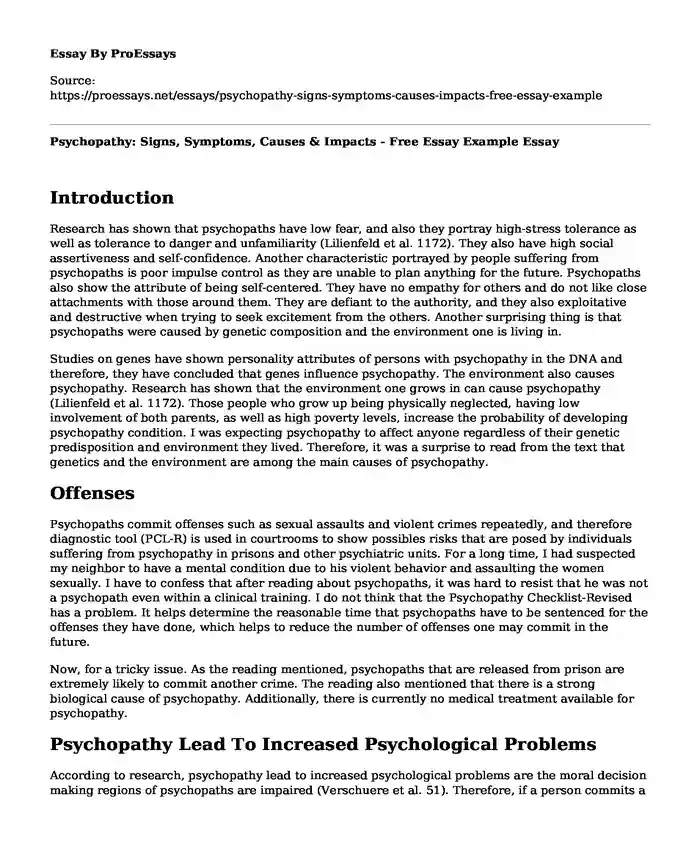Introduction
Research has shown that psychopaths have low fear, and also they portray high-stress tolerance as well as tolerance to danger and unfamiliarity (Lilienfeld et al. 1172). They also have high social assertiveness and self-confidence. Another characteristic portrayed by people suffering from psychopaths is poor impulse control as they are unable to plan anything for the future. Psychopaths also show the attribute of being self-centered. They have no empathy for others and do not like close attachments with those around them. They are defiant to the authority, and they also exploitative and destructive when trying to seek excitement from the others. Another surprising thing is that psychopaths were caused by genetic composition and the environment one is living in.
Studies on genes have shown personality attributes of persons with psychopathy in the DNA and therefore, they have concluded that genes influence psychopathy. The environment also causes psychopathy. Research has shown that the environment one grows in can cause psychopathy (Lilienfeld et al. 1172). Those people who grow up being physically neglected, having low involvement of both parents, as well as high poverty levels, increase the probability of developing psychopathy condition. I was expecting psychopathy to affect anyone regardless of their genetic predisposition and environment they lived. Therefore, it was a surprise to read from the text that genetics and the environment are among the main causes of psychopathy.
Offenses
Psychopaths commit offenses such as sexual assaults and violent crimes repeatedly, and therefore diagnostic tool (PCL-R) is used in courtrooms to show possibles risks that are posed by individuals suffering from psychopathy in prisons and other psychiatric units. For a long time, I had suspected my neighbor to have a mental condition due to his violent behavior and assaulting the women sexually. I have to confess that after reading about psychopaths, it was hard to resist that he was not a psychopath even within a clinical training. I do not think that the Psychopathy Checklist-Revised has a problem. It helps determine the reasonable time that psychopaths have to be sentenced for the offenses they have done, which helps to reduce the number of offenses one may commit in the future.
Now, for a tricky issue. As the reading mentioned, psychopaths that are released from prison are extremely likely to commit another crime. The reading also mentioned that there is a strong biological cause of psychopathy. Additionally, there is currently no medical treatment available for psychopathy.
Psychopathy Lead To Increased Psychological Problems
According to research, psychopathy lead to increased psychological problems are the moral decision making regions of psychopaths are impaired (Verschuere et al. 51). Therefore, if a person commits a crime and is found to be a psychopath, he or she should not be held responsible for their criminal actions. The condition leads to emotional deficits that reduce the moral capability of a person. As the reading above indicates, psychopaths released from prisons have a higher probability of committing another crime, which shows that their moral behavior is impaired. Therefore, they should only be guided and advised but not be held criminally responsible for their criminal actions.Do you think it would be justified to refuse to let them back into society (i.e. keep them in prison), even if their crime was relatively minor (theft, drug possession, etc.)? Why or why not?
Conclusion
Psychopaths are humans with rights and therefore, should not be kept in prisons. Refusing to let them back into society will be violating their rights. Psychopaths do not commit crimes willingly like other people, and therefore it would be unfair to keep them in prisons regardless of the crimes they have committed. They should not be taken into prison in the first place because the condition impairs their moral behavior.
Works Cited
Lilienfeld, Scott O., et al. "Is boldness relevant to psychopathic personality? Meta-analytic relations with non-Psychopathy Checklist-based measures of psychopathy." Psychological Assessment 28.10 (2016): 1172.
Verschuere, Bruno, et al. "What features of psychopathy might be central? A network analysis of the Psychopathy Checklist-Revised (PCL-R) in three large samples." Journal of Abnormal Psychology 127.1 (2018): 51.
Cite this page
Psychopathy: Signs, Symptoms, Causes & Impacts - Free Essay Example . (2023, Oct 13). Retrieved from https://proessays.net/essays/psychopathy-signs-symptoms-causes-impacts-free-essay-example
If you are the original author of this essay and no longer wish to have it published on the ProEssays website, please click below to request its removal:
- Lifespan Development: Adolescence
- Critique of Linda Hasselstrom's "a Peaceful Woman Explains Why She Carries a Gun"
- Research Paper on Trauma and Veteran Homelessness
- Schizophrenia and the Movie A Beautiful Mind Paper Example
- Essay Example on Living Ethically: A Paradox of Human Rights & Nature
- Essay on 3 Steps to Reduce Stress: Practical, Emotional & Acceptable Methods
- Human Behavior for Risk Management - Report Example







